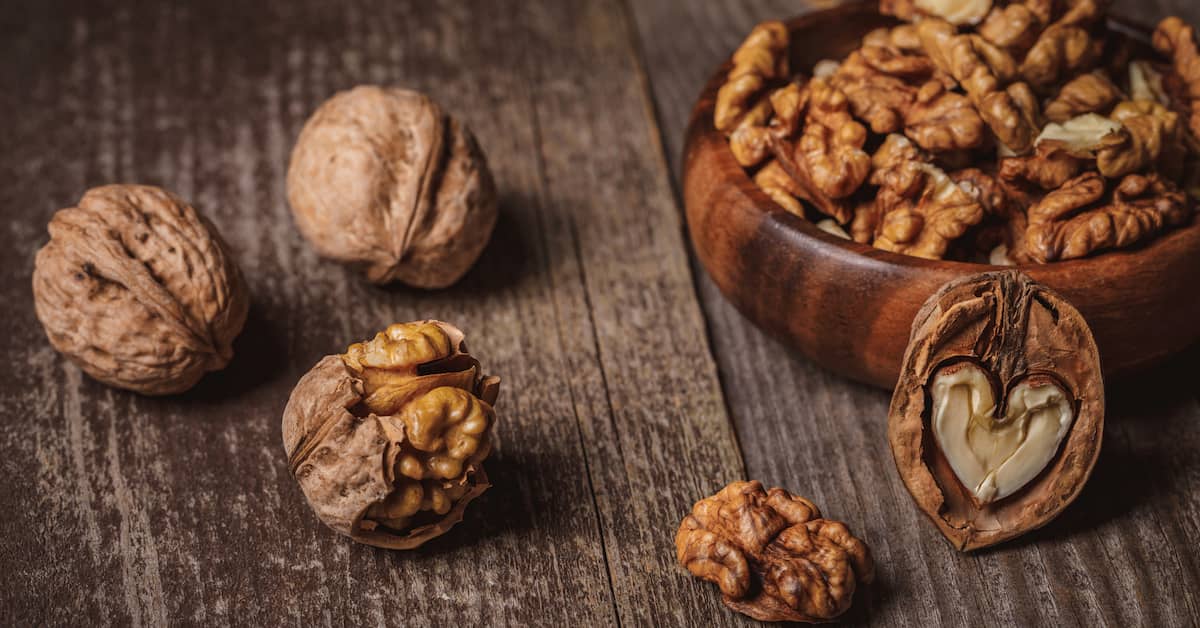
In fact, researchers say this snack food has so many health benefits it can even lengthen your life.
So, let’s take a closer look at the healthy snack that should be at the top of your grocery list….
I’m talking about walnuts. Studies show that walnuts contain a higher number of antioxidant compounds than any other common nut.1 These antioxidants don’t just help you fight disease as you age, they help your body maintain its physical fitness and strength. A study in Asia has shown that the peptides – natural combinations of amino acids – found in these types of nuts might help some people resist muscle-loss that happens as you get older.2 (Studies show that after middle age, you lose three percent of muscle mass every year, on average.)
The researchers explain that these natural chemicals are rich in the amino acids, arginine, phenylalanine, and leucine, that “are good dietary choices for elderly individuals, as they enable muscle protein synthesis.”
Along with that, add the scientists, the compounds in walnuts ease inflammation that’s linked to muscle loss and help the mitochondria – energy-producing structures – in muscle tissue fuel muscle performance more effectively.
Living Longer With Walnuts
At the same time, a study at The Harvard T.H. Chan School of Public Health shows that older people who eat more walnuts have a lower risk of premature death and a longer life expectancy than folks who forego these nuts.3 “What we’ve learned from this study is that even a few handfuls of walnuts per week may help promote longevity, especially among those whose diet quality isn’t great to begin with,” says researcher Yanping Li, M.D., Ph.D. “It’s a practical tip that can be feasible for a number of people who are looking to improve their health.”This 20-year investigation analyzed health and diet data from more than 67,000 women taking part in the Nurses’ Health Study and 26,000 men who were enrolled in the Health Professionals Follow-up Study. The average age of the people taking part in the research was 63 years old.
The analysis showed that eating five or more servings of walnuts a week (each serving was an ounce) was connected to a 14 percent lower risk of dying during the study. Plus, the walnut eaters had a 25 percent lower risk of being struck down by cardiovascular disease.
Overall, in the Harvard study, the walnut eaters lived 1.3 years longer than the non-nut eaters. Meanwhile, the folks who ate two to four servings of walnuts a week also tended to live longer – a year more than the nut abstainers – and had fewer heart issues.
One reason might be that walnuts are higher in omega-3 fatty acids than any other nut, providing 2.5 grams of alpha lipoic acid (ALA) per one-ounce serving.4 What’s more, observational studies have shown that each gram (an ounce is 28 grams) of ALA you eat per day lowers your risk of dying from heart disease by ten percent.5
Walnuts: Small Snack With Big Benefits
Other recent studies have revealed an impressive list of additional health benefits linked to munching on walnuts. Walnuts can:- Help lower “bad” LDL cholesterol: A small study in healthy adults showed that eating a walnut-rich meal prevented oxidative damage from “bad” LDL cholesterol after eating, whereas a meal of refined, unhealthy fats did not provide the same benefit.6 Remember, when LDL oxidizes that’s when it builds up in your arteries, causing atherosclerosis.
- Lower your risk of cancer: Laboratory and human studies suggest that eating walnuts may reduce your risk of certain cancers, including cancers of the breast,7 prostate8 and colon.9 Researchers believe this may be because of the polyphenol ellagitannins that are converted in the gut to urolithins. Urolithins can have anti-inflammatory properties.10 In addition, urolithins have hormone-like properties that enable them to block hormone receptors in your body. This may help reduce your risk of hormone-related cancers, such as breast and prostate cancers.
- Improve your memory: Tests at Loma Linda University showed that consuming walnuts slowed the cognitive decline in people who were having memory problems as they got older. According to the researchers, the positive results seemed to be strongest in seniors who had been long-time smokers.11
- Improve your digestion: Eating walnuts may be one way to support the health of the good bacteria in your gut, or your gut microbiota. When 194 healthy adults ate 1.5 ounces (43 grams) of walnuts every day for eight weeks, they had an increase in beneficial bacteria, compared to when they were not eating walnuts.12
- Help with weight loss: Eating walnuts can help you lose weight. In a well-controlled study of ten people who were obese, drinking a smoothie made with about 1.75 ounces (48 grams) of walnuts once a day for five days decreased appetite and hunger, compared to a placebo drink equal in calories and nutrients.13 But that’s not all. After five days of consuming the smoothies, researchers scanned the participants’ brains and found they had increased activity in the area of the brain that helps resist eating junk food.
- Improve sperm quality and function: Researchers at the University of Utah report that walnuts, along with other tree nuts, can beneficially change the function of DNA in sperm for healthier sperm. They conclude that these epigenetic effects may be partly linked to walnuts’ high folate (B vitamin) content.14
My Takeaway
If this new research doesn’t motivate you to grab a handful of walnuts, I don’t know what will.And if you’re worried that walnuts are too rich in calories, you don’t have to fear. You’ll be surprised to learn that, while walnuts are calorie dense, research shows the calories you absorb from eating walnuts are 21 percent fewer than would be expected based on their caloric profile.
- https://pubmed.ncbi.nlm.nih.gov/27534138/
- https://www.ncbi.nlm.nih.gov/pmc/articles/PMC9143134/
- https://www.mdpi.com/2072-6643/13/8/2699
- https://nutritiondata.self.com/facts/nut-and-seed-products/3138/2
- https://pubmed.ncbi.nlm.nih.gov/23076616/
- https://pubmed.ncbi.nlm.nih.gov/24410903/
- https://pubmed.ncbi.nlm.nih.gov/26183374/
- https://pubmed.ncbi.nlm.nih.gov/27679440/
- https://pubmed.ncbi.nlm.nih.gov/27215566/
- https://pubmed.ncbi.nlm.nih.gov/26713565/
- https://academic.oup.com/ajcn/article/111/3/590/5698105
- https://pubmed.ncbi.nlm.nih.gov/29470389/
- https://pubmed.ncbi.nlm.nih.gov/28715141/
- https://onlinelibrary.wiley.com/doi/10.1111/andr.12911
